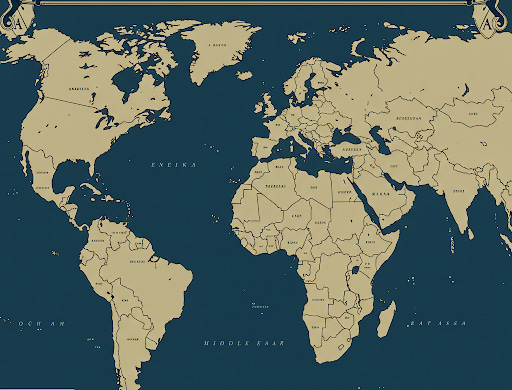America First, World Last? The Perilous Path of Trade Tariffs, and the potential 'New World Order.'
When "Making America Great Again" Risks Unmaking the Global Economy.
Ah, yes, a "serious" blog post. A rare and delicate bloom, indeed. Like a unicorn sighting at a tax audit, it's a spectacle to behold. Fear not, dear readers, for I, your humble scribe, have bravely ventured beyond the well-trodden paths of witty banter and snarky observations and have delved into the profound.
So, brace yourselves, clutch your metaphorical pearls, and perhaps pour a stiff drink—not to steady your nerves, but to add a touch of dramatic flair. For today, we're not merely discussing the absurdity of misplaced commas or the sheer audacity of mismatched socks. No, we're venturing into the truly terrifying realm of... checks notes... the erosion of critical thinking in the digital age, and how it's making us all susceptible to the subtle, yet insidious, creep of misinformation. You know, light, fluffy topics like that. Okay, so here we go.
The world is in a state of flux. The rise of populism, the decline of multilateralism, and the increasing assertiveness of some nations are all contributing to a more fragmented and unstable global order. One potential outcome of this trend is the emergence of five independent superstates: the United States of the Americas, Europe, the Baltics, the Middle East, and the Far East.
The Seeds of Division
This scenario is not far-fetched. The seeds of division are already being sown. The United States, under the Trump administration, has pursued a protectionist trade policy that has alienated many of its allies. This policy is based on the belief that America has been treated unfairly by its trading partners and that it needs to put its own interests first.
The United States' trade tariff policy, ostensibly designed to protect domestic industries and bolster the American economy, is a double-edged sword. While it might offer short-term gains for certain sectors, its long-term implications could, in theory, trigger a chain reaction of global economic destabilisation.
The logic behind tariffs is simple: by imposing taxes on imported goods, domestic products become more competitive. However, this is leading to retaliatory tariffs from other nations, potentially sparking trade wars that will inevitably disrupt global supply chains, inflate prices, and stifle economic growth. The resulting uncertainty is likely to discourage investment and hinder innovation, ultimately harming the very economy it was intended to protect.
This "America First" approach, while appealing to some, risks isolating the US from the global economy. By withdrawing from international trade agreements and erecting trade barriers, the US could, in theory, undermine the system of interconnectedness that has driven global prosperity for decades.
A World Fractured: The Rise of Five Superstates
Subheading: From Global Village to Isolated Empires: A Dystopian Vision?
Taking this isolationist tendency to its theoretical extreme, imagine a world fractured into five independent superstates: the United States of the Americas, Europe, the Baltics, the Middle East, and the Far East. This scenario, while seemingly fantastical, offers a chilling glimpse into a potential future shaped by unchecked nationalism and economic fragmentation.
Potential Upsides: A Mirage of Stability?
Reduced Localised Conflicts: The sheer power of these superstates might deter smaller conflicts, leading to a period of relative peace within their borders.
Economic Consolidation: Internal trade barriers would likely fall, creating vast, unified markets within each superstate, potentially boosting efficiency.
Resource Management: Unified governments could, in theory, manage resources more effectively, addressing environmental and infrastructural challenges on a grand scale.
Political Stability (Within): In certain regions, consolidation could mitigate internal strife, fostering a semblance of political stability.
The Dark Side: A Recipe for Global Catastrophe
Increased Superstate Conflicts: While smaller conflicts might decrease, the potential for devastating wars between these behemoths would dramatically increase.
Loss of Cultural Diversity: The homogenisation of cultures within each superstate could erase unique regional identities and traditions.
Economic Inequality (Between): Disparities between the superstates could widen, leading to resource wars and economic instability.
Authoritarianism: The concentration of power could breed authoritarian regimes, suppressing individual liberties.
Violent Transition: The shift to this new world order would be a period of extreme violence and global instability.
The Fatal Trade-Off: Bigger Problems, Not Fewer.
Ultimately, this scenario trades numerous smaller problems for a few colossal, potentially apocalyptic ones. The initial allure of stability and economic efficiency within each superstate masks the inherent dangers of a world teetering on the brink of inter-superstate conflict.
The American trade tariff policy and the isolationist mindset it represents serve as a cautionary tale. While the desire to "make America great again" is understandable, doing so at the expense of global cooperation and stability is a dangerous gamble. The path to true prosperity lies not in isolation but in collaboration and a recognition of our shared destiny on a planet that demands unity, not division.
Whether this strategy reflects a calculated approach or a more instinctive one is subject to debate. Some believe the methods are erratic, and others believe a strategy is behind the seemingly erratic behaviour. Regardless of the intent, the effects of those tariffs have real-world consequences for both now and the future.
Anyway, fear not! Before you all start stockpiling tinned goods and digging back garden bunkers, let's remember who we're dealing with here. Me. Your friendly Bristol-based purveyor of mild chaos and slightly exaggerated observations. While I can occasionally dust off the 'serious discourse' hat and pontificate on the 'shared destiny of humanity' (yawn), rest assured, my natural habitat is the delightfully absurd.
So, while we've momentarily dipped our toes into the deep end of geopolitical angst, prepare yourselves for a swift return to the shallows of satirical silliness. Next time, I'll be back to dissecting the truly pressing issues: like whether pigeons are government drones, or if socks mysteriously vanish in the laundry dimension. Stay tuned, and remember, a world without a little absurdity is a world not worth living in... or at least, not worth blogging about.



